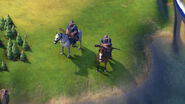The American people represent a civilization in Civilization VI. Their colors are dark blue and white, and they are led by Teddy Roosevelt.
The Americans' civilization ability is Founding Fathers, which halves the time needed for them to receive government legacy bonuses. (In Rise and Fall, it converts all of their government's slots for Diplomatic Policy Cards into Wildcard slots.) Their unique unit is the P-51 Mustang (which replaces the Fighter), and their unique building is the Film Studio (which replaces the Broadcast Center).
Strategy
America is possibly more than any other civilizations equipped towards the late game. With the exception of the bonus to ![]() Combat Strength, all of the bonuses kick in later than most other civilizations. This gives Teddy a chance to catch up if he's lagging behind the other civilizations, unlike many other civilizations. If you enter the later eras already leading, you will most likely run away from all of your competition.
Combat Strength, all of the bonuses kick in later than most other civilizations. This gives Teddy a chance to catch up if he's lagging behind the other civilizations, unlike many other civilizations. If you enter the later eras already leading, you will most likely run away from all of your competition.
Founding Fathers
Government legacy bonuses are a type of permanent bonuses that last throughout the entire game once you've earned them. America earns them in half the normal time, which effectively means that they double the legacy bonuses of other civilizations. This can be very powerful, but takes quite some time to ramp up.
In order to start earning the bonuses as early as possible, it's advisable to build Monuments as well as seek out other sources of ![]() Culture. Spending the extra effort to trigger the applicable
Culture. Spending the extra effort to trigger the applicable ![]() Eureka Eurekas may also be worthwhile.
Eureka Eurekas may also be worthwhile.
Since the legacy bonuses are much larger for America compared to other nations, the type of legacy bonus may affect your choice of government more than usual.
Roosevelt Corollary
In early eras, this will only provide a bonus to ![]() Combat Strength to all fighting happening on your home continent. The bonus is very significant, as you only need +30
Combat Strength to all fighting happening on your home continent. The bonus is very significant, as you only need +30 ![]() Combat Strength relative to another unit to kill it in one shot. It essentially offsets a Deity AI's +4
Combat Strength relative to another unit to kill it in one shot. It essentially offsets a Deity AI's +4 ![]() Combat Strength bonus, putting you on even ground. It can also be used defensively and offensively, provided the generation of the continents allow for such an opportunity.
Combat Strength bonus, putting you on even ground. It can also be used defensively and offensively, provided the generation of the continents allow for such an opportunity.
Continents are not always very intuitive. There is a specific lens in the game that clearly shows the difference between the continents, and should be used when you are scouting. It is quite possible that two adjacent tiles are, in fact, different continents.
Once Rifling is researched, the Americans will receive another unique unit: the Rough Rider. This is an excellent unit for defending or attacking on your home continent, as well as clearing out barbarian camps. Defeating enemies with the Rough Rider gives free ![]() Culture.
Culture.
Finally, National Parks are improved. They increase the Appeal in the city they are built, which in turn directly increases their ![]() Tourism output, as well as the number of people that can live in each Neighborhood.
Tourism output, as well as the number of people that can live in each Neighborhood.
Film Studio
The Film Studio is a straight upgrade for the Broadcast Center. In addition to all the normal benefits, it increases ![]() Tourism pressure of the owning city by 100%.
Tourism pressure of the owning city by 100%.
Victory Types
America is by far most suited to a Cultural Victory. By sticking with Classical Republic throughout the early ages, they can build up a substantial bonus to Great Person generation through the rest of the game, and use their National Parks and Film Studios to overrun all other civilizations with their massive ![]() Tourism output.
Tourism output.
They can also go for a Domination Victory by sticking with an Oligarchy throughout the early ages, using their ![]() Combat Strength bonus early and strong and experienced armies later.
Combat Strength bonus early and strong and experienced armies later.
While there is nothing preventing them from seeking out a Science or Religious Victory, they don't have any particular abilities that help them out in that regard, either.
Civilopedia entry
In terms of civilization, the progress of America from a collection of squabbling colonies to a globe-spanning superpower has been meteoric. Product of waves of immigration, it is currently the world’s fourth largest country and third most populous, spanning the width of the North American continent from Atlantic to Pacific and site of some of humanity’s greatest cities. With the world’s largest GDP (gross domestic product), service sector, media industry, and military GFP (global firepower factor, not including nuclear weaponry), America could be considered the world’s foremost – or at least most influential – current civilization.
Some historians argue that America can be dated to the founding of thirteen English colonies along the eastern seaboard on the North America continent, colonies composed of landless second sons of British gentry, get-rich-quick adventurers, convicts, debtors, religious zealots, political radicals, and some folks just looking for a better life. Other immigrants – African slaves, European indentured servants and the like – arrived not by choice but due to misfortune. Whatever the circumstance, this rowdy rabble laid the foundation for the “melting pot.”
These newcomers quickly put their superior firepower and technology to use against the indigenous population, launching two centuries of conflict and atrocity. By 1776, the native tribes east of the Mississippi were either obliterated, displaced or subjugated. And, due to the expanding western frontier and their role in the British victory in the French and Indian War in 1763, the “Americans” soon developed an unseemly sense of self-sufficiency and independence. In a few short generations from those initial settlements at Roanoke, Jamestown, Plymouth and other inhospitable places, these Americans dared to agitate against The Crown for treatment equal to that accorded citizens in the homeland.
Led by Virginia gentry and New England intellectuals, the colonists went from celebrating a victory with Britain over the French to engaging in armed conflict against Britain in just 12 years. If the British Parliament had only followed Ben Franklin’s satirical “Rules by Which a Great Empire May Be Reduced to a Small One” (1773), a succinct summation of colonial grievances, England may have given up the Americas as a troublesome investment a lot sooner. Like most family squabbles, the most important factor was money; the colonials chafed under what they considered to be unfair economic restrictions and taxes from Great Britain. Meanwhile, the British (along with a few die-hard loyalists) generally thought that the Americans were an ungrateful rabble who had no idea how much money the Crown was spending on their protection and progress.
By the late 1770s the American colonies were in open revolt, and on July 4, 1776, after intense debate and hand-wringing, their collective representatives declared independence – setting off the Revolutionary War. The fight “raged” from April 1775 through October 1781. It was the usual confused civil conflict, guerrilla warfare in the South and much marching to-and-fro in the North. The Continentals (as the rebellious colonists were known) were outgunned and outmanned by the highly trained and battle-tested British Army, particularly since the vaunted British Navy had absolute control of the seas ... until the French and Spanish joined toward the end of the 1770s.
In late 1781 the Continental Army besieged General Cornwallis’s British force at Yorktown. With the French Navy off-shore the British were unable to escape, and Cornwallis surrendered to the American George Washington, hero of the Revolution. Two years later, a peace treaty was finally signed, giving the new republic all lands east of the Mississippi (save Florida which went to Spain), allowing American merchants the right to pursue their avarice across the globe through “free trade,” and formally recognizing the new nation.
With the unpleasantness over, the American “patriots” set about cobbling together a federal republic. The initial attempt, the “Articles of Confederation and Perpetual Union,” ratified in 1781 proved stunningly ineffectual, for it granted the government no authority to tax its citizens, no ability to maintain a military force, and had no executive officer to oversee things. The leaders of the new United States Congress quickly noted these and other flaws; they soon convened a secret convention meeting in Philadelphia in 1787 to revise the Articles. Instead, after much pontificating and argument, the conventioneers drafted a new Constitution entire, one adopted by the states in 1789, giving the United States’ government its present shape – more or less. That same year Washington was elected the first president. In 1791 a Bill of Rights was added; since then 17 more amendments have been added and another six proposed to get it right.
With “life, liberty, and the pursuit of happiness” now guaranteed for its citizens, the new nation set about its own happiness – rapid expansion. In 1803, Napoleon Bonaparte, no longer interested in some barbaric outpost on a distant continent, sold the French territory of Louisiana and beyond to the United States in the greatest property transfer in history. Having little knowledge of what he had paid the exorbitant sum of $11.25 million for, President Jefferson dispatched a couple of military officers to explore and report back on the new territory. As it turned out, the upstart country had nearly doubled in size. But it was by no means the end of American land grabs, and only by the end of 1853 had the United States assumed its current continental expanse.
With expansion came conflict, and 1861 saw the ultimate family feud: the Civil War (or War for Southern Independence, or the War Between the States, or the War of Secession, or Mr. Lincoln’s War, or less-polite names). What followed was four-years of the bitterest type of conflict, leaving some 600,000 Americans dead and 400,000 wounded. The war resulted in the emancipation of Southern slaves, the virtual annihilation of the Southern infrastructure, constitutional limitations on states’ rights, long-lasting regional acrimony, and – sure to be heartening to every American – an income tax to finance the Union war effort.
No longer distracted, and driven by a sense of manifest destiny, hopes for a better life, and the usual hunt for adventure and wealth, homesteaders, prospectors, merchants, preachers and outlaws flooded the lands to the west. In a couple of generations, even remote reaches of America had a semblance of sophistication (after slaughtering the indigenous inhabitants), given the fortunes being made in minerals and livestock and timber, and sensibility, thanks to the God-fearing families settling this “Wild West.” All along the eastern and gulf seaboards, European immigrants – drawn by the “American Dream” – poured into the country. These were the people who died by the thousands to break the sod, build the railroads, mine the mountains, and end the lawlessness.
Despite distractions in distant lands, Americans at the beginning of the 20th Century were optimistic and gripped by a complacent belief in liberalism and progressivism – marked by political reform, scientific progress, sound Christian values, urbanization, and imperialism. Meanwhile, authors and composers were crafting a new kind of American literature and music. But while American industrial, cultural, and economic power continued to grow, American military strength did not keep pace.
All this optimism and idealism came to a sudden halt in the first decades of the new century: America’s involvement in the First World War, the 1918-1919 Spanish influenza pandemic, the Stock Market crash and resulting “Great Depression,” the “moral decay” of the Roaring Twenties and the environmental disaster of the Dust Bowl. The good times were over. With the initiation of Prohibition (remember what they say about the best of intentions), the unholy union of Big Business and Big Politics was joined by “Big Crime” (and later, “Big Media”); not-so-organized crime became organized and the “families” that had only nibbled at the edges of the American economy now took large bites while gangsters such as Dillinger and Capone became media and folk heroes not seen since the days of the dime westerns.
The United States was only saved from all this by the outbreak of the “Good War.” On December 7, 1941 – after the conflict in Europe had raged for two years while the United States stayed ostensibly aloof – America was attacked by the Empire of Japan. Within days, Nazi Germany and Fascist Italy declared war on the United States and the Second World War was on. After learning from its mistakes, by late 1942 the country was on the offensive in all theaters and supplying the Allies with the tons of materials they needed to win the war. The war ended in 1945 when America dropped atomic bombs two Japanese cities.
However, the newly minted superpower quickly found itself embroiled in a different kind of war. Initiated by the Soviets drawing an Iron Curtain across Eastern Europe, the Chinese Communist Revolution and the first successful Russian atomic bomb test, the “Free World” squared off against the “Evil Empire” (as the Soviet Union was labelled by U.S. President Reagan in 1983). The West and the East contended for the “hearts and minds” of Earth’s inhabitants. In every realm (including the space race and scientific progress) and place, the contestants spent vast sums and great efforts building ever more lethal weapons, subverting governments, creating armed alliances, conducting convoluted espionage, suppressing or assassinating political dissidents, engaging in proxy wars, and flooding each other’s airwaves with propaganda. Meanwhile, the citizens of all nations watched the skies for mushroom clouds to blossom. In 1989, the Curtain finally came down as the East European nations threw out the Soviets. By any reasonable calculation, the Cold War was a colossal, expensive blunder for everyone concerned.
The United States enjoyed a new era of peace and self-satisfaction ... for about a decade. On September 11, 2001, a group of terrorists traced to an organization named “al-Qaeda” flew commercial jetliners into the World Trade Towers in New York City and the Pentagon in Washington, DC. The September assault took almost 3000 lives, mostly civilian, and caused an estimated $10 billion in damage. The ongoing “War on Terror” had begun.
In the midst of all this, America moved towards putting into practice the lofty ideals of freedom and equality it had espoused since its inception. Since the Second World War several social movements including Women’s Lib, Civil Rights, Red Power, LBGT Rights (among others), have altered the patterns of American life. The media spread these – and some less savory aspects of – America to every corner of the globe. Heretofore, the world’s great empires have been based on either military might or industrial power, but America’s may be the first based on the export of culture and its beliefs embedded therein by a globe-spanning media machine.
City Names
Citizen Names
Males:
- Absalom
- Archibald
- Ephraim
- Isaiah
- Jedidiah
- Jethro
- Obadiah
- Phineas
- Rufford
- Thaddeus
Females:
- Abigail
- Amber
- Charity
- Eleanor
- Grace
- Patience
- Penelope
- Sarah
- Temperance
- Virginia
Modern Males:
- Benjamin
- Dennis
- Forrest
- Frank
- Harlan
- Max
- Paul
- Ryan
- Thomas
- Wilbur
Modern Females:
- Abby
- Alice
- Dorothy
- Ginger
- Kelly
- Lana
- Nancy
- Pamela
- Tracy
- Velma
Trivia
- The American civilization's symbol is a shield with three stars and stripes on it, which is modeled after the shield on the Great Seal of the United States. (Its shape, however, is more similar to the steel shield originally used by Captain America, which was also modeled after the shield on the Great Seal.)
Gallery
Videos
Related achievements

|
100th Anniversary
As America make a National Park of Crater Lake and both tiles of Yosemite in one game.
|

|
Let Teddy Win
Win a regular game as Theodore Roosevelt
|

|
Pizza Party!
Activate Leonardo da Vinci in New York with Great Works from Michelangelo and Donatello -- and a sewer -- all in that city.
|





